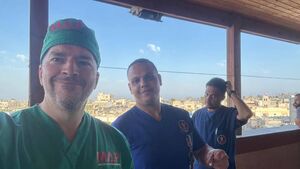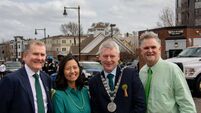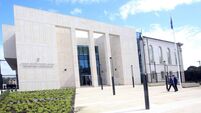The UHW doctor who's been to Gaza three times

Dr Morgan McMonagle with colleagues in Gaza. Photo: The Irish Times
Dr Morgan McMonagle, a trauma surgeon at UHW, gave a talk at SETU last week about his recent trip to Gaza where he worked in a tent hospital.
The event was part of Science Week at SETU.
He began his presentation with a brief history of trauma medicine – apparently the first fatality from a car accident happened in Ireland – as well as his own journey.
Dr McMonagle worked in Australia, Birmingham (where he operated on soldiers who were injured in the Iraq war), and Philadelphia (in the hospital where he worked, there was an average of six to eight gunshot wounds per night).
He was on duty during the 2017 London terrorist attacks, and also when a block of London apartments went on fire.
There has been a 20% increase in global conflict in the last five years.
He also worked in Ukraine six months after the war started.
As you can probably tell, he is not a man phased by much.
But when describing his experience of being a trauma surgeon in Gaza, it was clear that it was an entirely different level.
Dr McMonagle said that he could “hear constant drones all the time, it could drive you mad”, but “it’s the drones you don’t hear that you need to worry about”.
“The camera doesn’t do justice. The devastation in Gaza is impossible to get across. Just how awful the situation is, it is horrific.”
The building the doctors were supposed to be staying in had been bombed the day before they arrived, due to an “error”.
“Bombs went off every single night. If the windows rattled, that was fine, but if the whole wall rattled, it meant they were quite close.”
At one stage during the talk, Dr McMonagle went slightly off topic and started talking about what an amazing engineering feat the Apache helicopter was. He spoke about how accurate the attack of the aircraft could be, originally intended to save citizens' lives, because soldiers could be so precise with who they were targeting.
I was slightly bewildered as to why he would praise military equipment after all he's seen. But it quickly became clear that it was a kind of gallows irony.
He told us about Malik, a 13-year-old girl, the last person he operated on before he left last March. She had been running from an Apache helicopter with her family. Her two younger siblings, who were four and five, were killed. She was shot in her arms and legs.
"The world's most sophisticated machine has managed to hit the target in four different spots without any fatal injury. You have to know what you're doing to be able to do that," he said.
Dr McMonagle does not know if Malik is still alive, but if she is, she only has one limb.
There are only five pediatric ventilators in the Gaza Strip.
“Israel won’t allow ventilators in. They said it can be reshaped into an explosive device. You can make any arbitrary excuse you want.”
Dr McMonagle knows of nine children who have died of hypothermia.
“It's impossible for parents to keep their children warm in tents.
“There’s no heating, there’s no sanitation, there’s no running water, there’s no sewage [treatment], there’s no garbage collection.”
And so the horror stories continued.
Dr McMonagle told the audience about how the Israeli forces took over the newest wing of Nassar hospital for a few weeks and when they were finished, they burnt the entire wing down, “just because they can”.
He told us that after the hospital had been bombed, “dead bodies were in the courtyard. Nobody could go out to save them or to help them or to give them a proper burial".
“It was so common that you would have one surviving child and nobody else.”
He said he treated, "Five-year-old children with shrapnel in their brains, livers, legs."
“What you can see is a nation of severely disabled children.
“The first time I went over, I saw a lot of child amputees, but when I went back, I saw none. They can’t go outside. There are no more wheelchairs or prostheses and all the roads are destroyed.”
At the end of the talk, the audience gave Dr McMonagle a standing ovation, which Eoin Gill from Calmast said had never happened at a Science Week event at the college before.
Mr. Gill also encouraged the audience to donate to Medical Aid for Palestinians, the charity that organised for Dr McMonagle to go to Gaza.
You can donate through this link.






